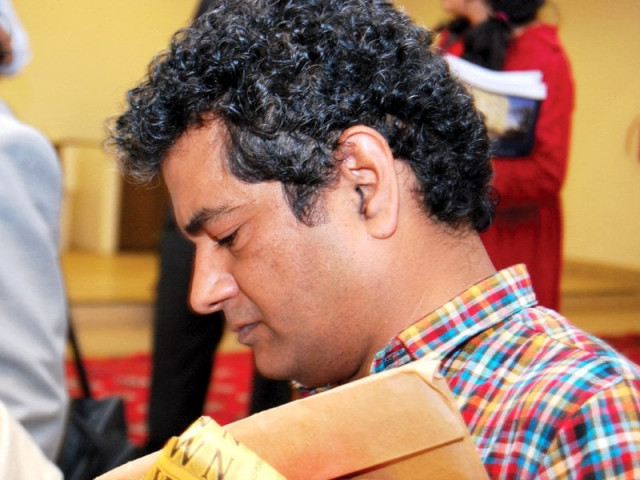1,000 days of solitude: The five that brought about the six stories
Author Hanif talks about narrating ‘horrific’ stories at ‘nice, happy’ places.

Hanif wants everything, except for the missing Baloch to recede into the background. PHOTO: ARIF SOOMRO/EXPRESS
The Lahore of today holds no special place in Mohammed Hanif’s heart. Now it is just a stop that he makes to catch up with friends on his way to his hometown, Okara. It is the city that he used to love when he was a teenager. “I loved it so much that I ran,” he says wryly. Now, it resembles a village “where everyone knows everyone”. He cherishes the anonymity that a big city like Karachi affords him.
Hanif wants everything, except for the missing Baloch to recede into the background. “I thought you wanted to talk to me about my [latest] work,” he says in the middle of answering a question about the recently held literary festivals at Karachi and Lahore.
He had read excerpts from the “horrific and painful” stories of the missing Baloch at the Lahore Literary Festival and Karachi Literary Festival, which he described as “nice, happy places”. There were some people who couldn’t even bear to hear them, Hanif says. Writing the stories also left him drained. Even though he usually translates his works himself, he had to ask his friends to translate these stories.

But why the Baloch when people from the Punjab, Khyber-Pakhtunkhawa and Sindh are also missing? It started in Balochistan way before it did in other places, Hanif says. He also feels that protests in the Punjab and the KP get registered. “The most high-profile missing person case is Dr Aafia Siddiqui. Her case gets a lot of media time... or used to, which is important. It should,” he says.
“What is peculiar about the Baloch people is that the media are not ready to cover their story. They have been camping for three months each in Islamabad, Karachi and Lahore outside press clubs. The idea [behind it] is to make it easier [for journalists to access them] because not many journalists go to Quetta,” he notes.
Initially, says Hanif, he was no different than the other journalists. But that changed when a colleague, also a Baloch, told him that five of his college classfellows had either been killed or were missing. The thought of five in a ‘small group’ disappearing nagged him and he ended up outside the press club.
He talked to quite a few of them. How did he zero in on the six stories that make up his latest ‘pamphlet’, as he calls it? “Access” was the defining criterion, he admits, adding, “I do know that there are stories, more horrific, that I haven’t done.”

He acknowledges that Balochistan’s ‘remoteness’ is a challenge for journalists from other provinces. To him, it can be one of the reasons that the stories go uncovered. In case of local journalists, the fear of the militias and state is also a possible and logical reason. Television, the most powerful of media, might not be interested because Balochistan has a small audience and no advertisers to offer, he says. “But all this is just guesses.”
The families of the missing Baloch marked a thousand days of protest a couple of months ago. Hanif hopes that the stories he has told will nudge the media, particularly television, into action, “I hope they give these people some air time.”
Published in The Express Tribune, March 1st, 2013.


















COMMENTS
Comments are moderated and generally will be posted if they are on-topic and not abusive.
For more information, please see our Comments FAQ